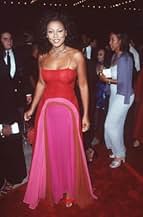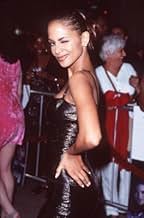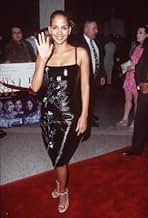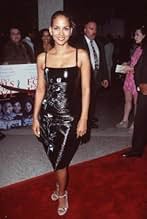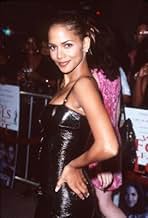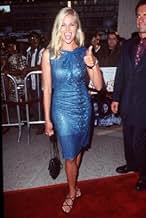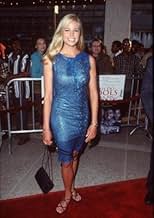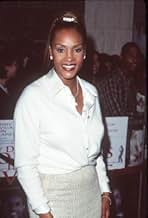Why Do Fools Fall in Love - Die Wurzeln des Rock'n'Roll
Originaltitel: Why Do Fools Fall in Love
IMDb-BEWERTUNG
6,4/10
4738
IHRE BEWERTUNG
Füge eine Handlung in deiner Sprache hinzuThree women each claim to be the widow of 1950s doo-wop singer Frankie Lymon, claiming legal rights to his estate.Three women each claim to be the widow of 1950s doo-wop singer Frankie Lymon, claiming legal rights to his estate.Three women each claim to be the widow of 1950s doo-wop singer Frankie Lymon, claiming legal rights to his estate.
- Auszeichnungen
- 2 Gewinne & 4 Nominierungen insgesamt
Miguel A. Núñez Jr.
- Young Little Richard
- (as Miguel A. Nunez Jr.)
Empfohlene Bewertungen
Other commentators seem to feel this is, or should have been, a movie about the life of Frankie Lyman. However, as the title indicates, it is really about three women who fell in love ... with a guy named Frankie Lyman. As the movie brings home fairly early, there is not much about Frankie to love. He is portrayed as a shallow, self-centered fool, with as little understanding of the music business as of the women he scams into being his wives.
Did Frankie have raw talent? Of course he did. Did Frankie do anything to develop this raw talent into an enduring musical career? No evidence of that. So much for Frankie. Larenz Tate plays him fairly well on stage, and rather flat off stage. We are not given a clue as to what the attraction may have been.
And, since two of the women were relatively unaware of his celebrity status when they were first taken with him, and the third had a celebrity status of her own, we expect the movie to answer the title question. The women do not entirely succeed in this, but they are terrifically watchable while they try.
Halle Berry is great as Zola Taylor, singer with the Platters. Viveca Fox is almost as good as the home girl who turns hooker to support Frankie, and Lela Rachon is perfect as the goodie-two-shoes last wife, a God-fearing and educated working woman.
The music scenes are good, and the courtroom scenes are outrageously unrealistic.
This would have been a better movie if they had not specifically based the story on Lyman, but only alluded to him. In this manner, the Hollywoodization of the story would have been less noticeable. Unfortunately, realizing that such a course would inevitably preclude using the Lyman hits, they chose to make this a triography of the wives, and allow them to play off Tate's weak Lyman persona.
All in all, a good couple of hours of enjoyment that is not too compelling. When it was over, we found ourselves asking, "Why DID these three fools fall in love?"
Did Frankie have raw talent? Of course he did. Did Frankie do anything to develop this raw talent into an enduring musical career? No evidence of that. So much for Frankie. Larenz Tate plays him fairly well on stage, and rather flat off stage. We are not given a clue as to what the attraction may have been.
And, since two of the women were relatively unaware of his celebrity status when they were first taken with him, and the third had a celebrity status of her own, we expect the movie to answer the title question. The women do not entirely succeed in this, but they are terrifically watchable while they try.
Halle Berry is great as Zola Taylor, singer with the Platters. Viveca Fox is almost as good as the home girl who turns hooker to support Frankie, and Lela Rachon is perfect as the goodie-two-shoes last wife, a God-fearing and educated working woman.
The music scenes are good, and the courtroom scenes are outrageously unrealistic.
This would have been a better movie if they had not specifically based the story on Lyman, but only alluded to him. In this manner, the Hollywoodization of the story would have been less noticeable. Unfortunately, realizing that such a course would inevitably preclude using the Lyman hits, they chose to make this a triography of the wives, and allow them to play off Tate's weak Lyman persona.
All in all, a good couple of hours of enjoyment that is not too compelling. When it was over, we found ourselves asking, "Why DID these three fools fall in love?"
It was true in the '50s and still is today: it's no exaggeration to state that most hitmaking careers are over in 18 months. Teen idols fare the worst, and such was the fate of Frankie Lymon, who scored but three Top 20 hits between February 1956 and the summer of 1957: "Why Do Fools Fall In Love," "I Want You To Be My Girl" (both with The Teenagers) and "Goody Goody" (as a soloist). After that, the industry and music buyers considered him to be yesterday's former fresh face. And, like most young teens who become overnight sensations, Frankie's firework-long popularity came to cripple him later as a) people would not accept him as anything other than a 13-year-old and b) he was utterly unprepared to cope with real life once his flash of fame had ended. An insightful peek into Frankie Lymon's mercurial life would have made a great movie -- but this isn't it. Instead, we get only a superficial look at Lymon, as the movie focuses instead on the three women who claimed to be his wife. Lymon does not deserve to be shoved into the background of his own biopic, especially as his story is representative of the rise and fall of many flash-in-the-pan artists who find themselves revered by the public one minute and then dumped into history's ashcan the next -- often before they really reach the summit of their skills. (Believe me -- as the writer of "The History Of Rock 'n' Roll," I know this all too well.) The three women battling over his estate were more a footnote to his story than the real drama and far too much time is allocated to letting the three female leads each take a star turn. Yes, Zola Taylor was the best-known of the three, but she is portrayed following her run with The Platters as an in-the-money solo star headlining live shows with her giant hit "Only You." Are the producers kidding? Zola Taylor didn't even JOIN The Platters until AFTER "Only You" had become a million-seller! The Platters scored big as the most successful hitmaking singing group of the late '50s (1955-9), despite the fact that the "group" was really lead vocalist Tony Williams -- with the others as mere background singers. (What were The Doors, for example, without Jim Morrison?) Zola only sang lead on a couple of minor Platters chart items -- and after leaving the act, immediately sank into near total obscurity. The Platters' golden era ended in 1960 after Tony left on his ill-fated solo career. (I explored this in great detail while assembling a 60-track Platters career retrospective 3-CD box set.) None of The Platters really made much money at all -- as they were mere salaried employees of their manager, Buck Ram. Ram wrote much of their material, told them what to sing and how, produced their records, owned The Platters' name and (no surprise) kept nearly all of the loot himself. The portrayal of Morris Levy, who owned several labels including Gee (the recording home of Lymon and The Teenagers) was pretty accurate. Not all record labels screwed artists as thoroughly as Levy's did, but his methods were none too unusual for the time. In fact, they're not much different than what the industry does today!
The filmmakers know you've heard this tale before - true life chronicle of a young singing star's rise and tragic fall - and so they wisely downplay the standard bio trappings and instead focus on a raucously entertaining ride through Frankie Lymon's woman troubles. The smart screenplay revolves around the court battle of Lymon's three wives (yes, three!) over song royalties, leading to vivid (and often humorously contradictory) flashbacks of their lives with the singer. Larenz Tate is magnetic playing the many different sides of the ever-changing lead character, but the film ultimately belongs to Halle Berry, Vivica A. Fox and Lela Rochon as the wives. Each is allowed to shine as the trio portrays 30 years of changes in the women's lives, with Fox drop-dead hilarious as the most outrageous of the three. There's beautifully detailed '60s-era cinematography, sets, costuming and musical numbers, plus a side-splitting turn by Miguel Nunez as a young Little Richard. Major issues (such as '60s race relations) are barely glanced at, but what this film lacks in depth, it makes up for ten-fold in entertainment value. A winner!
An interesting (but flawed account) of the battle over pop star Frankie Lymon's estate by three women claiming to be his widow...
The story portrayed here is actually semi-fictitious, but the background story of Frankie's life is entirely true.
From his starts as a fresh-faced Harlem kid to a haunted drug addict, Larenz Tate (one of the most underrated talents in Hollywood) shines as dreamer Frankie, and does well to give perspective to Frankie's conflicting attitudes towards his relationships with the women, which the script muddles- Frankie appears shallow yet introspective at the same time.
Halle Berry tries to make more of her understated and thin role as Zola Taylor, wifey no. 2, but provides an adequate performance.
The most developed of the three female characters, is Elizabeth Waters (Viveca A. Fox). Loyal yet dishonest, gritty Elizabeth is the only character aside from Frankie that seems to be real. This is a combined effort by the characterisation and the performance by Fox.
And Lela Rochon does very well cast against type, as a school marm dragged into this battle. Rochon clearly understands the character well, and manages to make her mark on the story despite being developed late into the film.
The period detail of this piece is well captured over the 20-odd years that this story is set (particularly the performances of Frankie with the Teenagers), and even the small scenes which provide insight into Frankie's younger days.
The main flaws of this film lie essentially in the struggle to develop some of the themes. As mentioned earlier, Frankie's reasons for bigamy are not established at all or how he copes this with this, or whether one of the wives in particular is lying about the legitimacy of her marriage.
Some of the characterisation is a bit thin, caused by some of the later events of the film and because this deep story of fame, loss, betrayal and torment has such a muddled structure the whole film comes across as sketchy by the end which clearly was not intended.
But never the less this is an adequate tribute, to the world of fame and its inevitable clingers-on, and those just caught up in the action. This will never be top of its genre however...
The story portrayed here is actually semi-fictitious, but the background story of Frankie's life is entirely true.
From his starts as a fresh-faced Harlem kid to a haunted drug addict, Larenz Tate (one of the most underrated talents in Hollywood) shines as dreamer Frankie, and does well to give perspective to Frankie's conflicting attitudes towards his relationships with the women, which the script muddles- Frankie appears shallow yet introspective at the same time.
Halle Berry tries to make more of her understated and thin role as Zola Taylor, wifey no. 2, but provides an adequate performance.
The most developed of the three female characters, is Elizabeth Waters (Viveca A. Fox). Loyal yet dishonest, gritty Elizabeth is the only character aside from Frankie that seems to be real. This is a combined effort by the characterisation and the performance by Fox.
And Lela Rochon does very well cast against type, as a school marm dragged into this battle. Rochon clearly understands the character well, and manages to make her mark on the story despite being developed late into the film.
The period detail of this piece is well captured over the 20-odd years that this story is set (particularly the performances of Frankie with the Teenagers), and even the small scenes which provide insight into Frankie's younger days.
The main flaws of this film lie essentially in the struggle to develop some of the themes. As mentioned earlier, Frankie's reasons for bigamy are not established at all or how he copes this with this, or whether one of the wives in particular is lying about the legitimacy of her marriage.
Some of the characterisation is a bit thin, caused by some of the later events of the film and because this deep story of fame, loss, betrayal and torment has such a muddled structure the whole film comes across as sketchy by the end which clearly was not intended.
But never the less this is an adequate tribute, to the world of fame and its inevitable clingers-on, and those just caught up in the action. This will never be top of its genre however...
I enjoyed a lot of this movie but I would have liked a tad more insight into the life of Frankie Lyman. In one scene, he talks about his abusive father, but other than that, there was little revealed about him. I understand it was mostly from his wives point-of-view, but it have helped the story along. In addition, you couldn't tell which of the wives was spinning a tale in order to get a larger settlement.
The large cast was very talented and I especially appreciated that the make-up on the three women was not overdone to make them age. All in all, I enjoyed it very much, but it could have been much better.
The large cast was very talented and I especially appreciated that the make-up on the three women was not overdone to make them age. All in all, I enjoyed it very much, but it could have been much better.
Wusstest du schon
- WissenswertesWhen Tina Andrews wrote the original script, the part of Frankie Lymon was first offered to Michael Jackson.
- PatzerWhen the scenes changes to Lamberton Prison in 1985, Diana Ross' version of "Why Do Fools" is more than once referred to as a new hit, when in fact, it was released in 1981.
- Zitate
Emira Eagle: Maybe there were three separate Frankies, and each of us got a piece.
- SoundtracksWhy Do Fools Fall in Love
Written by Frankie Lymon and Morris Levy
Performed by Frankie Lymon and the Teenagers
Courtesy of Rhino Entertainment Company/EMI Records UK Ltd.
Top-Auswahl
Melde dich zum Bewerten an und greife auf die Watchlist für personalisierte Empfehlungen zu.
- How long is Why Do Fools Fall in Love?Powered by Alexa
Details
- Erscheinungsdatum
- Herkunftsland
- Sprache
- Auch bekannt als
- Why Do Fools Fall in Love
- Drehorte
- Produktionsfirmen
- Weitere beteiligte Unternehmen bei IMDbPro anzeigen
Box Office
- Bruttoertrag in den USA und Kanada
- 12.461.773 $
- Eröffnungswochenende in den USA und in Kanada
- 3.946.382 $
- 30. Aug. 1998
- Weltweiter Bruttoertrag
- 12.461.773 $
- Laufzeit
- 1 Std. 56 Min.(116 min)
- Sound-Mix
- Seitenverhältnis
- 1.85 : 1
Zu dieser Seite beitragen
Bearbeitung vorschlagen oder fehlenden Inhalt hinzufügen


